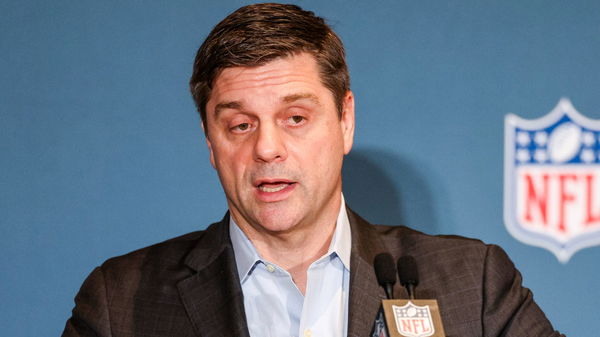
Getty
PONTE VEDRA, FL – MARCH 27: Adam Scott of Australia hits a tee shot on the 5th hole during the third round of the Players Championship at the TPC Sawgrass, on March 27, 2004, in Ponte Vedra, Florida. (Photo by Harry How/Getty Images)

Getty
PONTE VEDRA, FL – MARCH 27: Adam Scott of Australia hits a tee shot on the 5th hole during the third round of the Players Championship at the TPC Sawgrass, on March 27, 2004, in Ponte Vedra, Florida. (Photo by Harry How/Getty Images)
The PGA Tour sits on $1.5 billion, which it got 18 months ago, but spending it could fracture its fragile alliances. Just an actual day into the job, new CEO Brian Rolapp finds himself in a tight spot. Veteran journalist Eamon Lynch argues the Tour must invest part of that war chest to strengthen ties with the DP World Tour. However, this vision clashes with the Strategic Sports Group’s (SSG) priorities.
Watch What’s Trending Now!
Many SSG investors, including Fenway Sports Group, reportedly oppose funding Europe’s circuit. Consequently, that tension now puts Rolapp in a difficult bind. To move forward, he must balance investor expectations with golf’s long-term global health. The challenge marks a defining early test for Rolapp.
Meanwhile, the DP World Tour remains vital to the PGA Tour’s global ambitions. Rolapp understands this from his NFL background, where global expansion shaped strategy. Moreover, Lynch emphasized that global alignment builds credibility and expands golf’s reach. Strengthening ties with Europe can boost co-sanctioned events and broaden fan bases. “Some of that slush fund ought to be allocated to consolidating relations with the DP World Tour,” Lynch advised. A tighter alliance could elevate international tournaments and help neutralize LIV’s global pitch. Nevertheless, making this investment requires political finesse—and prioritizing long-term vision over quarterly optics.
ADVERTISEMENT
Still, that vision won’t come cheap—or conflict-free. SSG invested $1.5 billion in the Tour 1.5 years ago. Now, Rolapp controls that untouched capital. However, every dollar spent invites scrutiny from investors expecting near-term returns. According to Lynch, “annual cash obligations to the European circuit are unpopular with the SSG investors.” Therefore, Rolapp must now choose between stabilizing global partnerships and pacifying powerful stakeholders. “He needs to weigh the long-term health of the professional game against short-term balance sheet concerns,” Lynch warned in his Golf Week report. That balance may define his legacy—or unravel it early.
Importantly, this isn’t the first time the PGA Tour has leaned on its European ally. In 2020, when the DP World Tour faced pandemic-driven financial strain, the PGA Tour stepped in with critical support. That partnership helped stabilize the global calendar and built goodwill between the tours. Since then, joint events like the Genesis Scottish Open and the Barbasol Championship have showcased the potential of a stronger transatlantic alliance. However, the financial burden has grown, and not everyone welcomes it. As Lynch noted, “annual cash obligations to the European circuit are unpopular with the SSG investors.” That history now shapes Rolapp’s present dilemma.

Imago
Brian Rolapp, new CEO of PGA Tour
With that backdrop, Rolapp now holds the pen to the next chapter. His leadership must fuse financial prudence with strategic vision. In particular, strengthening the DP World Tour could help reclaim golf’s global narrative and limit LIV’s expansion. Yet doing so without investor backlash will take savvy diplomacy. As Lynch put it, “He needs to weigh the long-term health of the professional game against short-term balance sheet concerns.” For Rolapp, the stakes are clear: build global strength now or risk fragmentation later. Ultimately, his legacy will hinge not on the dollars spent but on the alliances preserved.
ADVERTISEMENT
Top Stories
Furious Golf Fans Sign Petition Demanding Suspended PGA Tour Pro’s Reinstatement

Jon Rahm Has the Last Laugh as DP World Tour Decides on LIV Golf Fines – Insider

Jordan Spieth Feels Envious of PGA Tour Pro 6 Years His Junior, All Because of a Simple Golf Trait

Nelly Korda & Co. Stopped From Teeing Up as $2.1M Tournament Faces Unexpected Disruption

Disqualified PGA Tour Pro’s True Character Clear as He Opens Up on Using Banned Item at Torrey Pines

ADVERTISEMENT
Investor priorities clash with the PGA Tour’s global strategy push
This tension has put Rolapp in a high-stakes standoff, with professional golf’s future hanging in the balance. This internal clash highlights the larger identity crisis within the PGA Tour. Should it serve investors, players, or the sport itself? Rolapp inherits a landscape where power is fragmented, and his executive decisions will likely be contested. His ability to prioritize global growth while managing boardroom expectations could define not just his tenure but golf’s entire trajectory in the post-LIV era.
Notably, the Strategic Sports Group (SSG) includes heavyweights like Fenway Sports Group, owner of the Boston Red Sox and Liverpool FC. Their entry into the PGA Tour was seen as a vote of confidence in its commercial potential. However, their priorities skew toward profitability and asset growth, often at odds with slower, global expansion strategies. As a result, Rolapp must now navigate this dynamic, where “investors fancy themselves day-to-day managers,” as Lynch noted, complicating any move that doesn’t promise immediate returns.
Despite ongoing tensions, past collaborations between the PGA Tour and DP World Tour have delivered clear benefits. For instance, co-sanctioned events like the Genesis Scottish Open and the Barbasol Championship have elevated international exposure and player crossover. These efforts helped stabilize the DP Tour post-pandemic and laid the groundwork for a more unified global calendar. Accordingly, Rolapp’s challenge is to deepen that success, without alienating the very investors funding it.
ADVERTISEMENT
ADVERTISEMENT
ADVERTISEMENT
ADVERTISEMENT
